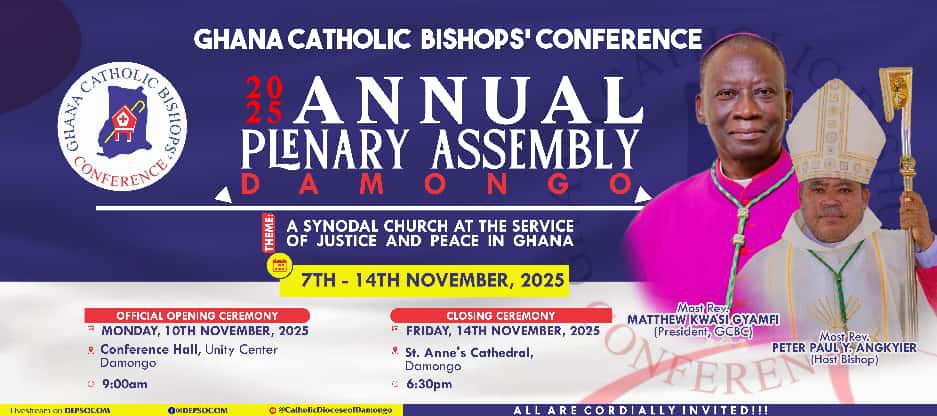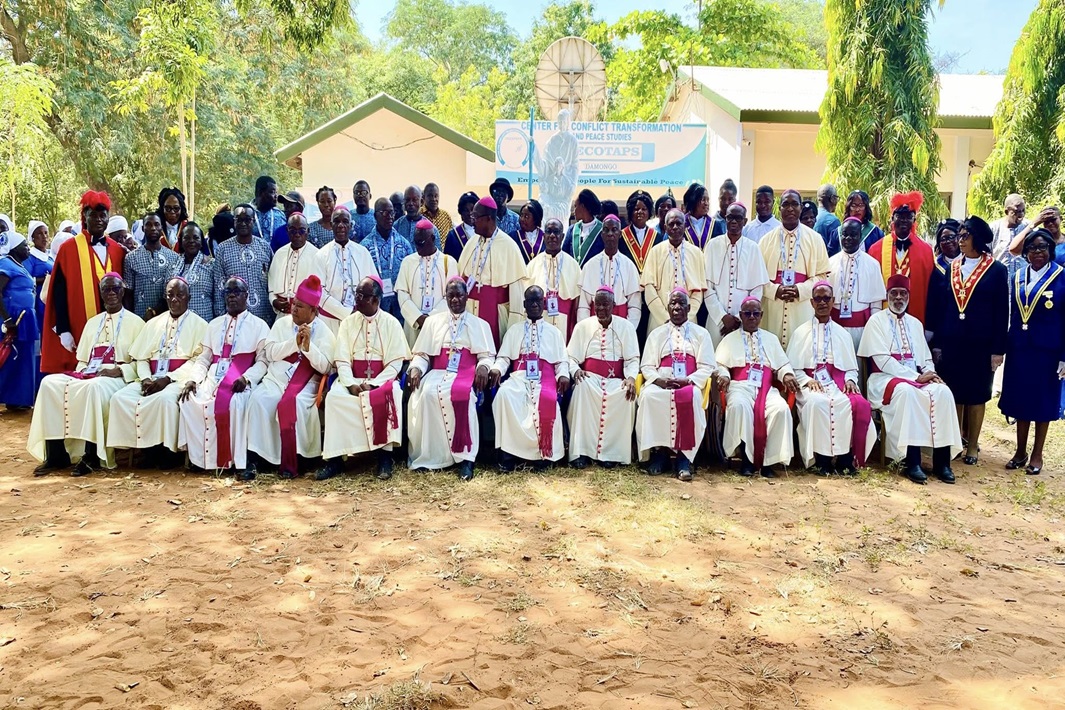By Paschal Norbert
DAMONGO, NOVEMBER 11, 2025 (CISA)-The President of the Ghana Catholic Bishops’ Conference (GCBC), Most Rev. Matthew Kwasi Gyamfi, has called for a renewed national commitment to dialogue, justice, and collective responsibility, warning that Ghana’s celebrated stability is threatened by deepening political tensions, environmental destruction, and communal conflict. Speaking at the opening of the 2025 Plenary Assembly in Damongo on November 10, the Bishop of Sunyani said the Church’s synodal journey must inspire the nation to walk together “in truth, humility, and hope” to secure lasting peace and social cohesion.
Opening the assembly under the theme “A Synodal Church at the Service of Justice and Peace in Ghana,” Bishop Gyamfi stressed that synodality is not a bureaucratic innovation but a spiritual and social necessity in a time of national strain.
“Synodality challenges us to embody hope together, to listen, to discern, and to act as one body animated by the Holy Spirit,” he said, adding that the Church “is not an institution that commands from above but a pilgrim people who walk together, translating faith into works of justice and peace.”
He rooted this year’s deliberations in Ghana’s contemporary realities, pointing out that although the country remains a reference point for democratic governance in the region, the 2024 General Elections revealed troubling fault lines.
Independent reports, he noted, described them as “among the most violent since the beginning of the Fourth Republic,” with over 100 arrests, several deaths, and injuries recorded nationwide.
“Democracy without conscience is fragile; without truth and justice, it risks becoming ritual rather than renewal,” Bishop Gyamfi warned.

Touching on illegal mining, he lamented the continued devastation of Ghana’s environment, describing the phenomenon not only as an ecological disaster but a grave moral failure.
“Over 60 percent of our rivers and streams are polluted, and thirty-four forest reserves compromised. Environmental destruction is a silent form of violence against the vulnerable and a sin against creation itself,”he said.
He emphasized that women, children, and poorer rural communities bear the greatest burden of poisoned water sources and lost livelihoods.
On national peace and security, the GCBC President cited protracted ethnic and chieftaincy conflicts, particularly in Bawku, where renewed hostilities since 2021 have claimed between 200 and 300 lives and forced closures of schools, markets, and hospitals. He further highlighted the influx of more than 15,000 asylum seekers from Burkina Faso fleeing Sahel violence.
“Peace cannot exist without justice, and security cannot endure without compassion,” he stated, praising local communities for “heroic generosity with little external support.”
Bishop Gyamfi outlined the Church’s ongoing synodal witness through active democratic participation, conflict mediation and a firm commitment to human dignity. He highlighted the GCBC’s collaboration with national institutions during the 2024 elections, including deploying 500 observers across 14 regions and establishing a Situation Room with state and international partners. Similarly, he cited mediation efforts under the Sahel Peace Initiative and faith-based humanitarian support for refugees.
“The Church’s pastoral accompaniment is not theoretical advocacy; it is faith translated into healing action,” he said.
He also referenced the Church’s increasing engagement in environmental stewardship, from the Green Ghana campaign to parish ecological projects and national advocacy against illegal mining. Emphasizing Pope Francis’ Laudato Si, the bishop insisted that “creation is not property to exploit but a sacred gift to protect.”
Bishop Gyamfi said the Assembly will focus on strengthening Catholic education, deepening peacebuilding efforts, confronting illegal mining, safeguarding religious freedom in schools, and critically examining the proposed Hate Speech Bill. He insisted that protecting institutional independence and democratic accountability remains a moral obligation for the Church and all citizens.
